Sarah Chorn's Blog, page 95
September 13, 2013
Discussion | YOUR Award Goes To….
 Justin of Staffer’s Book Reviews is notorious for discussing the ins and outs of book awards. Recently he went to WorldCon and wrote up this post about making his own awards. Well, this is interesting to me for multiple reasons. First of all, I live in Utah, which is a crappy state at the best of times. I don’t think I’ve ever heard an author/publisher/cool genre person ever say, “Hey, let’s go to Utah because Utah is amazingly hardcore and lots of people live there who want their books signed/want to go to an event.” This state is a black hole. No one comes here. It’s the forgotten land with weird alcohol laws. Then, you add a two-year-old and paying off cancer debt to the list, and you see why I never get to be involved in the stuff I’d LOVE to be involved in.
Justin of Staffer’s Book Reviews is notorious for discussing the ins and outs of book awards. Recently he went to WorldCon and wrote up this post about making his own awards. Well, this is interesting to me for multiple reasons. First of all, I live in Utah, which is a crappy state at the best of times. I don’t think I’ve ever heard an author/publisher/cool genre person ever say, “Hey, let’s go to Utah because Utah is amazingly hardcore and lots of people live there who want their books signed/want to go to an event.” This state is a black hole. No one comes here. It’s the forgotten land with weird alcohol laws. Then, you add a two-year-old and paying off cancer debt to the list, and you see why I never get to be involved in the stuff I’d LOVE to be involved in.
Basically, I’m like so many of the people out there. I’m a huge genre fan who dedicates the amount of time I’d spend at a full time job to running this website for the past three years, and because of my location and finances, I’m pretty much left out of everything. This is why Justin’s idea for a new award is so interesting to me. Anything that even toys with the idea of involving the general genre populous in some big genre event peaks my interest. We are all fans, and I know so many of us would love to be more involved, but we can’t be for one reason or another.
So, let’s play pretend for a moment.
If you were the judge, jury, and executioner of an award (IE: In charge of the whole thing), who, as of now, would get your awards for the 2012- current 2013 year for:
1. Best Novel
2. Best First Novel
3. Best Editor
4. Best Short Story/Short Story Collection
5. Best Fan Writer (lets put blogs in this category because, really, what are we if we aren’t fan writers)?
6. Best Publisher
Feel free to say why you picked all these people. Let’s throw some bones out there, and let people know who should be recognized, and why. No, this isn’t as cool as going to a convention and the only thing I can give out is this neatobandito picture of a trophy, but this is all about “let’s pretend.” I’m interested in who you would vote for.
So, your Award of the Bookworm (Check out that cheesy title) would go to….
September 12, 2013
Books I’m Eyeing
Books I’m Eyeing is a (hopefully) weekly series wherein I show you the books that have intrigued me, and the blogs and reviews we can all blame that on. My goal is to make my library hate me because of all the holds I have placed. This feature will show you just how I’m accomplishing that.
Do any of these books interest you? Or are there some that I’ve missed but should check out? Let me know!
—
News: Check out this really, really amazing project that The Skiffy and Fanty Show are rolling out for 2014. Anyone who knows how absolutely obsessed I am with other geographic regions and cultures will know that this project has me just about as excited as I can possibly get. Pay attention. This is neat.
—
 The Blue Blazes – Chuck Wendig
The Blue Blazes – Chuck Wendig
Discovery blamed on: 52 Book Reviews
About the Book
Meet Mookie Pearl.
Criminal underworld? He runs it.
Supernatural underworld? He hunts in it.
Nothing stops Mookie when he’s on the job.
But when his daughter takes up arms and opposes him, something’s gotta give…
The Blue Blazes – the first in a new urban fantasy series in which lovable thug Mookie Pearl must contend with the criminal underworld, the supernatural underworld, a new drug that makes the invisible visible, and a rebellious teen daughter who opposes him at every turn.
—-
 Ascension - Jacqueline Koyanagi
Ascension - Jacqueline Koyanagi
Discovery blamed on: A Dribble of Ink
About the Book
Alana Quick is the best damned sky surgeon in Heliodor City, but repairing starship engines barely pays the bills. When the desperate crew of a cargo vessel stops by her shipyard looking for her spiritually advanced sister Nova, Alana stows away. Maybe her boldness will land her a long-term gig on the crew. But the Tangled Axon proves to be more than star-watching and plasma coils. The chief engineer thinks he’s a wolf. The pilot fades in and out of existence. The captain is all blond hair, boots, and ego . . . and Alana can’t keep her eyes off her. But there’s little time for romance: Nova’s in danger and someone will do anything–even destroying planets–to get their hands on her.
—
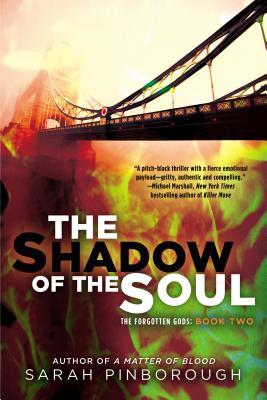 The Shadow of the Soul – Sarah Pinborough
The Shadow of the Soul – Sarah Pinborough
Discovery blamed on: King of the Nerds
About the Book
A devastating terrorist attack has crippled London. To find a perpetrator who is more than human, Special Branch turns to Detective Inspector Cass Jones.
Cass is already investigating a series of student suicides, but saying no to Special Branch isn’t an option—even when he’s hit with a much more personal and deeply disturbing mystery: a message left for him by his murdered brother revealing that Cass’s nephew was stolen at birth.
Cass’s investigations and his search for the boy lead him down a dark labyrinth to the shadowy Mr. Bright and his otherworldly allies—and into the middle of an ancient and deadly feud, with no less than the fate of humanity hanging in the balance
—
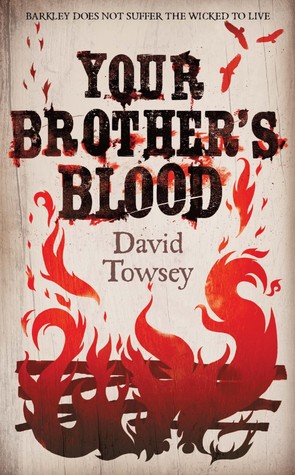 Your Brother’s Blood – David Towsey
Your Brother’s Blood – David Towsey
Discovery blamed on: The Speculative Scotsman
About the Book
Thomas is thirty-two. He comes from the small town of Barkley. He has a wife there, Sarah, and a child, Mary; good solid names from the Good Book. And he is on his way home from the war, where he has been serving as a conscripted soldier.
Thomas is also dead – he is one of the Walkin’.
And Barkley does not suffer the wicked to live.
—
 The Darwin Elevator – Jason M. Hough
The Darwin Elevator – Jason M. Hough
Discovery blamed on: The Little Red Reviewer
About the Book
In the mid-23rd century, Darwin, Australia, stands as the last human city on Earth. The world has succumbed to an alien plague, with most of the population transformed into mindless, savage creatures. The planet’s refugees flock to Darwin, where a space elevator—created by the architects of this apocalypse, the Builders—emits a plague-suppressing aura.
Skyler Luiken has a rare immunity to the plague. Backed by an international crew of fellow “immunes,” he leads missions into the dangerous wasteland beyond the aura’s edge to find the resources Darwin needs to stave off collapse. But when the Elevator starts to malfunction, Skyler is tapped—along with the brilliant scientist, Dr. Tania Sharma—to solve the mystery of the failing alien technology and save the ragged remnants of humanity.
—
 Saxon’s Bane – Geoffery Gudgion
Saxon’s Bane – Geoffery Gudgion
Discovery blamed on: Civilian Reader
About the Book
Fergus Sheppard’s world changes forever the day his car crashes near the remote village of Allingley. Traumatised by his near-death experience, he returns to thank the villagers who rescued him, and stays to work at the local stables as he recovers from his injuries. He will discover a gentler pace of life, fall in love ¬ and be targeted for human sacrifice.
Clare Harvey’s life will never be the same either. The young archaeologist’s dream find ¬ the peat-preserved body of a Saxon warrior ¬ is giving her nightmares. She can tell that the warrior had been ritually murdered, and that the partial skeleton lying nearby is that of a young woman. And their tragic story is unfolding in her head every time she goes to sleep.
Fergus discovers that his crash is uncannily linked to the excavation, and that the smiling and beautiful countryside harbours some very dark secrets.
As the pagan festival of Beltane approaches, and Clare’s investigation reveals the full horror of a Dark Age war crime, Fergus and Clare seem destined to share the Saxon couple’s bloody fate.
—
 The Written – Ben Galley
The Written – Ben Galley
Discovery blamed on: Fantasy Book Critic
About the Book
His name is Farden. They whisper that he ‘s dangerous. Dangerous is only the half of it. Something has gone missing from the libraries of Arfell. Something very old, and something very powerful. Five scholars are now dead, a country is once again on the brink of war, and the magick council is running out of time and options. Entangled in a web of lies and politics and dragged halfway across icy Emaneska and back, Farden must unearth a secret even he doesn t want to know, a secret that will shake the foundations of his world. Dragons, drugs, magick, death, and the deepest of betrayals await. Breathtakingly vast, chillingly dark, brooding and dangerous, The Written will leave you impatiently waiting for the next adventure Welcome to Emaneska.
—
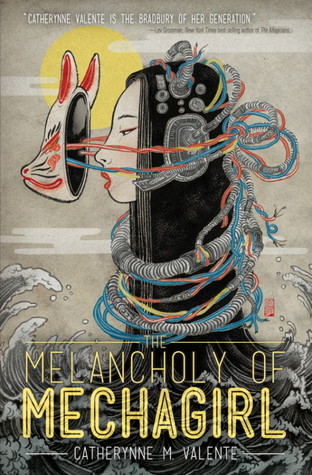 The Melancholy of Mechagirl – Catherynne Valente
The Melancholy of Mechagirl – Catherynne Valente
Discovery blamed on: SF Signal
About the Book
Science fiction and fantasy stories about Japan by the multiple-award winning author and New York Times best seller Catherynne M. Valente.A collection of some of Catherynne Valente’s most admired stories, including the Hugo Award-nominated novella Silently and Very Fast and the Locus Award finalist “13 Ways of Looking at Space/Time,” with a brand-new long story to anchor the collection.
September 11, 2013
The Lost Prince – Edward Lazellari
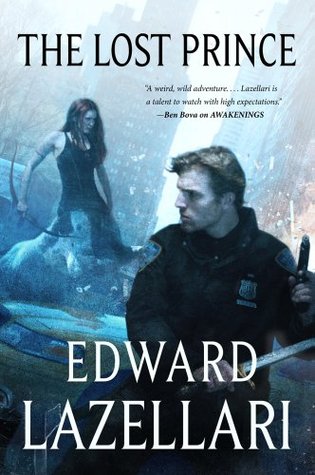 About the Book
About the Book
Edward Lazellari brings you The Lost Prince, and the race to find the missing prince is on . . .
In Lazellari’s debut fantasy, Awakenings, New York City cop Cal MacDonnell and photographer Seth Raincrest found themselves stalked by otherworldly beings intent on killing them. The two had to accept the aid of a mysterious woman to unlock their hidden pasts, and what they discovered changed their lives.
Everything they knew about their lives was an illusion. They had in fact travelled to our dimension from the medieval reality of Aandor to hide their infant prince from assassins, but upon arriving, a freak mishap wiped their memories. Cal, Seth, and the rest of their party were incapacitated, and the infant prince was lost.
Thirteen years later, that prince, Daniel Hauer, is unaware of his origins–or that he has become the prize in a race between two powerful opposing factions. Cal and Seth’s group want to keep Daniel safe. The other wants Daniel dead—by any means necessary.
From the streets of New York City to the back roads of rural North Carolina, the search for the prince sets powerful forces against each other in a do-or-die battle for the rule of the kingdom of Aandor.
352 pages
Published by Tor
Author’s webpage
This book was provided for my review by the publisher.
—–
I’ve learned over the years that I’m a real sucker for authors who aren’t afraid to mercilessly blend fantasy and reality. This smashing-together of worlds fascinates me. I love it when there are other dimensions, or worlds that are infused with mythological creatures. When these mythological creatures aren’t overly-sexed vampires/weres of some sort, color me purple with excitement.
Enter: Edward Lazellari.
I read Awakenings while I was in the midst of cancer drama, so I’m going to be totally honest here and admit that I really don’t remember much of it. That’s not a reflection on the author. Cancer treatment just about killed my memory. The combination of treatment and stress made a vast swath of my life fragmentary and shadowed, at best. None of that should really matter to any of you, aside from the fact that if you’ve read Awakenings, and your memory is complete crap like mine, never fear. The Lost Prince fills in the gaps quite nicely and brought me up to speed, triggering whatever half-functioning crap serves as my memory these days (thanks, cancer). Furthermore, if a book usually brings people up to speed, it involves lots of infodumps and long “remember when” type diatribes that drive me crazy. Lazellari, thankfully avoids all that sort of tedious stuff. He fills in the gaps in such an elegant way; you never really realize that he’s doing it.
This also means that instead of comparing The Lost Prince to Awakenings, like I normally would, I won’t. The Lost Prince stands well on its own two feet, and deserves to be reviewed as such, for that fact, as well as the fact that cancer axed my memory.
All of that being said, I do recommend people read Awakenings before starting on The Lost Prince. Due to the fact that this is the second book in a series, I will try very hard to be deliberately vague on any spoilerish details.
The Lost Prince starts out with our somewhat uncomfortable gang thrown together and traveling, looking for the prince they were supposed to protect. They are always a step behind the competition, and the stress is thick and pumped into the group dynamics smoothly and realistically. Cal and Seth are the main characters with the most compelling stories. They will inevitably serve to hook the readers. Their past is a mystery, and the mess of their lives is nothing short of fascinating. Lazellari follows them as they try to find the prince, as well as learn their place in the world and come to terms with their own fragmented pasts. It’s quite a compelling, emotional story. Furthermore, these two characters don’t really get along so well, so their own adventures together are often full of the sarcastic, tense humor that I tend to enjoy so much. Lazellari does a great job with really subtly bringin relationship dynamics to light, and playing with them in a tense, but often understatedly humorous way.
Daniel, the thirteen-year-old boy they are searching for is also a lot of fun, in a surprising way. I usually struggle quite a bit with teenaged characters because, honestly, I am not a teen, and I just can’t relate. Lazellari doesn’t dumb down Daniel at all. He’s full of enough adult emotions and sensations to make him easy for the adult audience Lazellari writes for, easy to relate to him and care about his story. That’s really saying something because, in all honesty, I really do turn off almost completely when a teenaged character is inserted into the book in any main fashion.
The Lost Prince starts out tense, and Lazellari keeps the tension ramping up higher and higher until the climactic finish. Awakenings ended on a cliffhanger, which really bothered a lot of readers. The Lost Prince works toward a nice, cohesive finish. Furthermore, questions are answered, while plenty more are raised, which promises another installation in this incredibly fun series. Lazellari works the plot twists well, and while some of the developments are easily predicted, the book itself is fun enough for that predictability to matter less than it probably would otherwise.
Lazellari broadens his world as well as his characters. While I did feel that the cast was, perhaps, a bit larger than necessary to tell the story, each character is interesting in their own way. Many of the characters that were added are secondary, and they do all vary in their level of believability. Perhaps my biggest characterization issue was with the characters of the “other side.” They nearly fell into the “unbelievable antagonist” trope that was really unfortunate. There is a point where the evil bastard is such an evil bastard he’s nearly laughable, and occasionally the antagonists would toe that line.
Another niggling point I would make is the fact that much of this book happens on the go. This endless-road-trip might not bug some readers (for example, fans of American Gods might understand how a constantly-on-the-move book can be fantastic). Not everyone will enjoy that format. It could feel, for some, like it’s a lot of movement without any real progress until about the halfway point. Honestly, I’m ready to experience Aandor, to move beyond the comfort of our world and see what else Lazellari is capable of.
Perhaps what impressed me most about this book was how well Lazellari blends fantasy and reality. Our world is still our world, but he weaves in the promise of something more so realistically that the reader can’t help but wondering, “What if?” This, combined with his realistic, engaging characters, really makes The Lost Prince is deliciously complex. Lazellari keeps things interesting, and the ending is a perfect culmination of adventure, action, and growth. Furthermore, his blend of answered questions, while posing the right amount of riddles for future books to work through, leaves me wanting more.
4/5 stars
Lexicon – Max Barry
 About the Book
About the Book
At an exclusive school somewhere outside of Arlington, Virginia, students aren’t taught history, geography, or mathematics–at least not in the usual ways. Instead, they are taught to persuade. Here the art of coercion has been raised to a science. Students harness the hidden power of language to manipulate the mind and learn to break down individuals by psychographic markers in order to take control of their thoughts. The very best will graduate as “poets”, adept wielders of language who belong to a nameless organization that is as influential as it is secretive.
Whip-smart orphan Emily Ruff is making a living running a three-card Monte game on the streets of San Francisco when she attracts the attention of the organization’s recruiters. She is flown across the country for the school’s strange and rigorous entrance exams, where, once admitted, she will be taught the fundamentals of persuasion by Bronte, Eliot, and Lowell–who have adopted the names of famous poets to conceal their true identities. For in the organization, nothing is more dangerous than revealing who you are: Poets must never expose their feelings lest they be manipulated. Emily becomes the school’s most talented prodigy until she makes a catastrophic mistake: She falls in love.
Meanwhile, a seemingly innocent man named Wil Jamieson is brutally ambushed by two strange men in an airport bathroom. Although he has no recollection of anything they claim he’s done, it turns out Wil is the key to a secret war between rival factions of poets and is quickly caught in their increasingly deadly crossfire. Pursued relentlessly by people with powers he can barely comprehend and protected by the very man who first attacked him, Wil discovers that everything he thought he knew about his past was fiction. In order to survive, must journey to the toxically decimated town of Broken Hill, Australia, to discover who he is and why an entire town was blown off the map.
As the two narratives converge, the shocking work of the poets is fully revealed, the body count rises, and the world crashes toward a Tower of Babel event which would leave all language meaningless. Max Barry’s most spellbinding and ambitious novel yet, Lexicon is a brilliant thriller that explores language, power, identity, and our capacity to love–whatever the cost.
390 pages (hardcover)
Published on June 18, 2013
Published by Penguin
Author’s webpage
—–
Lexicon is a book I’m having a hard time reviewing. It wasn’t horrible, but it’s one of those books where the sum does not equal the brilliance of its parts. The idea is brilliant, the writing is solid, but the execution is somewhat flawed, and left me wanting, despite my overall enjoyment of the book as a whole.
Lexicon plays on a premise that any lover of language will enjoy. Words have power, literally, and Max Barry gets into the science of this magic system quite in depth. In fact, he does so over and over and over again throughout the book. While some of the ideas regarding how this magic system works are quite scientific and a little complex, the reiteration of the details nearly continuously got exhausting. I was hit over the head a little too frequently with all the nuances and details that went into how words work, the Poets, the school system, etc. By the time I was done, I felt like I was reading more about psychology than magic. I like magic systems to be logical and have science behind them, but I still like them to feel, well, magic.
Furthermore, regarding the magic system, some of the power words that Barry sprinkles throughout the book are just plain ridiculous looking and completely unpronounceable. They look like someone closed their eyes and just scrambled a bunch of random letters together. That takes away from the believability of the magic system and the seriousness of it. Honestly, how am I supposed to take “zttkcu” seriously?
Perhaps that’s putting the cart before the horse a bit, because despite my quibbles right off the bat, Lexicon does a lot of things right. The magic system is engaging (despite my issues with how frequently I was given the details as to how it works). The characters are interesting, in a somewhat distant and scientific sort of way. The story is part who-done-it, and part catastrophe, but completely engaging and moves at a fast clip. Barry obviously thought out his world, and how all the pieces of it fit together to make a whole, fascinating speculative fiction novel. No matter the issues I have, all of this works together and clicks into place nicely to create a fantastic, quick moving novel that will absorb the reader and entertain them endlessly.
The problems really start when I pick the novel apart. I already picked on the magic system a bit. The other issue I had was with the characters. There are a few main characters, Emily being the one that most readers will probably focus on, and like the most. Emily starts out as a hard luck street kid who gets chosen for a really special school which teaches the use of the magic system I described above.). Part of the problem here is what I mentioned about the magic system above. There was so much scientific reiteration on how the magic system functions that it almost permeates all the levels of the book. This causes a divide between the readers and the main characters. Emily is interesting, but I never quite connected with her on the level I like to connect with characters. Every time I felt myself really getting into her character, I was sidetracked with another scientific/detailed explanation of something that just popped me out of the zone a bit. That’s not just in regards to Emily, but with all of the characters. They are all interesting, their stories are compelling, but they never really attain a depth or ground past the magic system and the related drama that immerses them. To put it simply, I like to be able to picture characters living lives beyond that which I read about in the book. I just can’t do that with any of the characters in Lexicon.
The distance from the characters is unfortunate for many reasons, but the truth is, Emily’s story has the potential to be an absolutely compelling one. Disaster seems to follow this kid, and the ending is kind of bitter sweet in its own way. Emily’s story, and her interesting path to her own unique brand of some sort of redemption really is a good one. However, I just never got beyond thinking, “Huh. Cool.” When I easily could have been unable to tear myself from her, or her story. That is, probably, the thing that I lament most about Lexicon.
Despite it all, Barry does have a knack for writing. His descriptions are creative and rather inventive. He really brings the landscape and the emotional struggles his characters face to life for the reader. He fills his plot with artful tension that will often have readers on the edge of their seats. The book moves at a nice clip, though Lexicon is a little slow starting. It is full of twists and turns. Many of them will be rather predictable, but some will surely surprise you. Perhaps one of the biggest problems, which also was probably a key instrument in making me feel slightly divorced from this book and its characters, was the switch from past to present in the narrative. The switch between the two is never clear and it was probably about half way through the book before I even realized I was reading about things that happened in two different time periods. There was an “ah ha” moment where I realized what was happening and everything became so much clearer, it’s just unfortunate that it took so long for that to happen. Maybe I’m slow on the uptake, but it is jarring and that jarring feeling surely did help me feel distanced from the work overall.
Lexicon is one of those books that has a fascinating premise, fantastic writing, a wonderful, mysterious plot and a magic system that I could just die for. Everything I just said could spiral this book to five star realms, but the execution just didn’t work. The magic system was unique, but clunky. A slightly clumsy narrative made me feel divorced from the characters and much of the world and plot. These might seem like small issues, but the two worked well together to make Lexicon a wonderful, and absolutely frustrating read. Max Barry is a hell of a writer and can turn a phrase with the best of them. I just wish Lexicon had been a bit tighter.
3/5 stars
September 10, 2013
A-Z Bookish Survey
I don’t usually do this stuff, but I’m rather bored at the moment (Okay, the honest truth is that I’m avoiding editing something because, well, that’s how I roll). Anyway, I saw this on a few other blogs and it looked like a good time killer, and rather interesting. Sometimes I like to detour a little and see what others are reading/have read/whatever rather than analyze what I’m currently reading. If you’d like to participate, please do. I’d like to learn more about you, my darling reader.
(Apologies in advance, for some reason my website won’t follow my spacing instructions so some of the questions/answers are basically on top of each other. It’s messy. Oh well.)
—–
AUTHOR YOU’VE READ THE MOST BOOKS FROM:
Steven Erikson because, you know, BADASS.
Coming in a close second is K.J. Parker. Because, you know, BADASS again.
BEST SEQUEL EVER:
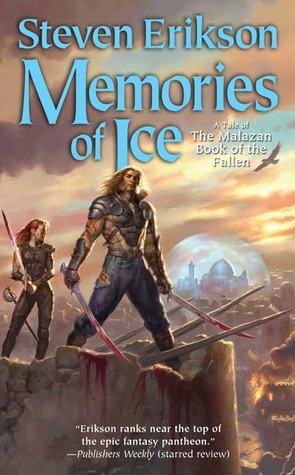
CURRENTLY READING:





Yeah, I’m that kind of reader.
DRINK OF CHOICE WHILE READING:
Tea, thankyouverymuch.
E-READER OR PHYSICAL BOOK:
Half and half. I get a lot of physical books, and there’s something about the feel and smell of a book that an e-reader can’t replace. That being said, because I have a glorious two-year-old who says, “LOOK MAMA!” and rips my books without realizing that she’s ruining things, I tend to get the job done a lot faster on an ereader.
FICTIONAL CHARACTER YOU PROBABLY WOULD HAVE ACTUALLY
DATED IN HIGH SCHOOL:
Gerald Terrant from C.S. Friedman’s books. I have a thing for evil, calculating bastards. I also have a thing for antiheroes. Give me a wonderful antihero, and I’ll probably develop some weird nerd crush on them.
GLAD YOU GAVE THIS BOOK A CHANCE:

This ended up being one of my absolute favorite series written by an author who I view as being some sort of literary god. To think, I almost didn’t read this because it looked boring to me. Now I am thinking of starting a cult dedicated to all things K.J. Parker.
HIDDEN GEM BOOK:

This is actually the first book in a trilogy called The Chronicles of Sirkara by Laura Resnick. Vastly underrated, incredibly well done, very entertaining epic fantasy that more people really need to read.
IMPORTANT MOMENT IN YOUR READING LIFE:
I’ll go with two. First, is reading this book because it started me thinking “Hey, maybe fantasy really isn’t bad.” It fertilized the ground so my brothers could plants Robert Jordan and George R. R. Martin seeds.

The second is starting this website, which has completely changed how I read. I’m a more thoughtful, detailed reader who isn’t afraid to try something new and different because of good ol’ Bookworm Blues.
JUST FINISHED:
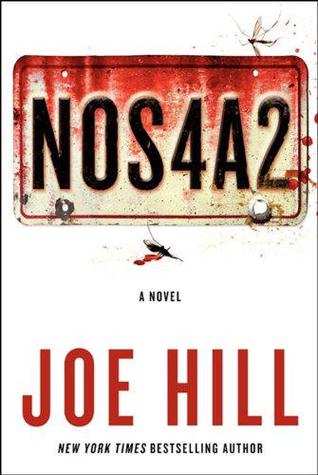

KIND OF BOOKS YOU WON’T READ:
Books with covers like this:

LONGEST BOOK I’VE READ:
I’m currently reading it.

MAJOR BOOK HANGOVER BECAUSE OF:
I read this book about two years ago and I still feel like I’m pulling myself out of it.

NUMBER OF BOOKCASES YOU OWN:
Currently, five bookcases. The better question is how many book piles do I have because of the number of books that don’t fit on my book cases. Um, about five moving boxes full, and at least five more piles randomly spread throughout my house.
ONE BOOK YOU HAVE READ MULTIPLE TIMES:

This series is so much fun.
PREFERRED PLACE TO READ:

QUOTE THAT INSPIRES/GIVES THE FEELS:
Read it here.
READING REGRET:
That I didn’t start reading Terry Pratchett or Kurt Vonnegut much, much sooner.
SERIES YOU STARTED AND NEED TO FINISH:

THREE OF YOUR ALL TIME FAVOURITE BOOKS:
In no particular order:


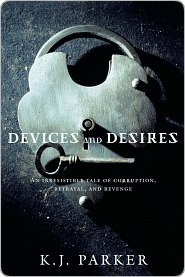
UNAPOLOGETIC FAN GIRL FOR:
K.J. Parker. Period. End of discussion.
VERY EXCITED FOR THIS RELEASE:
I’m done with the vampire fad, but I love Freda Warrington, so I’m very excited to see what she does with this book. Out October 2013.
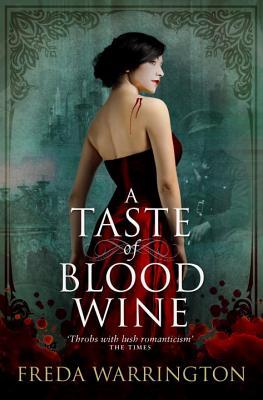
And I don’t think this one is out in the US until a little later, but I could be wrong:

WORST BOOKISH HABIT:
I just about refuse to finish a book/series that I LOVE because I NEVER WANT IT TO END.
X MARKS THE SPOT: START AT TOP LEFT AND PICK THE 27TH BOOK ON YOUR SHELF:
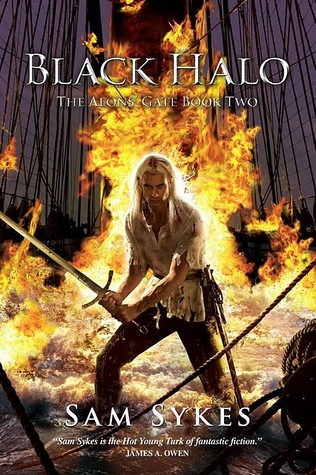
YOUR LATEST BOOK PURCHASE:

ZZZ-SNATCHER BOOK:
Just about any book does that if I let it. Currently the culprit is:

September 9, 2013
NOS4A2 – Joe Hill
 About the Book
About the Book
DON’T SLOW DOWN
Victoria McQueen has an uncanny knack for finding things: a misplaced bracelet, a missing photograph, answers to unanswerable questions. When she rides her bicycle over the rickety old covered bridge in the woods near her house, she always emerges in the places she needs to be. Vic doesn’t tell anyone about her unusual ability, because she knows no one will believe her. She has trouble understanding it herself.
Charles Talent Manx has a gift of his own. He likes to take children for rides in his 1938 Rolls-Royce Wraith with the vanity plate NOS4A2. In the Wraith, he and his innocent guests can slip out of the everyday world and onto hidden roads that lead to an astonishing playground of amusements he calls Christmasland. Mile by mile, the journey across the highway of Charlie’s twisted imagination transforms his precious passengers, leaving them as terrifying and unstoppable as their benefactor.
And then comes the day when Vic goes looking for trouble… and finds her way, inevitably, to Charlie.
That was a lifetime ago. Now, the only kid ever to escape Charlie’s unmitigated evil is all grown up and desperate to forget.
But Charlie Manx hasn’t stopped thinking about the exceptional Victoria McQueen. On the road again, he won’t slow down until he’s taken his revenge. He’s after something very special – something Vic can never replace.
As a life-and-death battle of wills builds - her magic pitted against his - Vic McQueen prepares to destroy Charlie once and for all… or die trying…
692 pages (Hardcover)
Published on April 30, 2013
Author’s webpage
—–
It has to be kind of hard being the son of horror legend Stephen King. Whoever knows who Joe Hill’s father is, is inevitably going to compare the two. It is hard not to look at Joe Hill’s writing and look for signs of his father’s style. King is a giant. Whether you like horror, or fantasy, or not, everyone who knows what a book is, also knows who King is. That being said, Hill is 100% his own man, and there’s absolutely no reason for the shadow of his father to hang over him. Hill stands on his own, and NOS4A2 proves it proudly.
NOS4A2 is the first book by Hill that I’ve had the pleasure of reading, but I can guarantee you that it won’t be the last. Hill understands just how to work the horror genre. It’s not about things that go bump in the night. NOS4A2 is psychological in the extreme. While the situations are wacky and weird with a wonderful dark edge, the true pleasure of NOS4A2 is just how easily Hill works his way into your psyche without you even realizing it. It almost defines what a horror novel should be about, purely because Hill so easily makes the reader understand the driving forces behind every character’s actions. There are no “good guys” or “bad guys.” Hill blurs the line. Everyone lingers in varying shades of gray, to charcoal, and Hill truly makes you live through them. It’s scary, because while you read this book, you look through the eyes of people who do some truly despicable things, and the trippiest part? Hill makes you relate to them, no matter how appalling these characters, and their actions are.
NOS4A2 follows a few primary characters, with a few others thrown in occasionally for good measure. The main character who will automatically pull readers in is Vic, who has an interesting ability to find things. True to the rest of the novel, Vic isn’t a sparkling white and innocent protagonist. Vic has a few strikes against her. Her family life is rather dysfunctional. Getting kidnapped (kind of), doesn’t help. Getting calls from dead kids who live in Christmasland really doesn’t do anything good for her. Vic is a true mess. She’s an addict and she’s unstable. I wouldn’t want her for my next door neighbor, but that’s part of her beauty. She’s not the protagonist you’d expect, but it’s her overwhelming imperfections that makes it so incredibly easy to become absolutely engaged and enamored by her. She’s three-dimensional, frustrating, emotionally damaged, and probably one of the most engaging characters I’ve ever read about.
If Vic is the character that really serves to pull people into NOS4A2, in my opinion, it’s Bing (The Gasmask Man) who really pushes NOS4A2 into the horror section, even moreso than Charles Manx, who represents the ultimate evil, in many ways. Bing is a rather horrible person. In fact, even thinking about him makes my skin crawl. He’s rather mentally stunted, and Manx takes advantage of that to manipulate Bing. Bing does some pretty appalling things, but he does it with a righteous zeal. Hill does wonders with Bing, using him as a sort of mental gateway into the darkness and depravity of Manx. Bing, however, is the kind of character in horror novels that really gets me to love that novel. He’s an interesting mixture of innocent, misunderstood, and absolutely morally disgusting and Hill really gets into Bing’s head, and thus, into the reader’s head.
On the flip side, Manx is the sort of antagonist I love. He’s calm, calculating, and absolutely believes in what he’s doing without the overwhelming religious-like zeal that so many authors heap on their antagonists. He never has evil super-villain moments where he laughs and talks about taking over the world. He’s just some guy trying to do what he wants to do. He doesn’t believe he’s a bad person, and that’s the magic of him. He’s so absolutely realistic in that regard. He’s just your everyday guy who is a total asshole but he thinks he’s an angel. All of these factors pumped into one person makes him absolutely eerie and a wonderful balance to Vic and Bing.
NOS4A2 takes some time to really get going. A lot of the novel is buildup for the grand finale (which takes up a good chunk of the last half of the book). When books take a long time getting to the meat of the matter, I usually lose interest. That being said, NOS4A2 doesn’t read like other novels. Each character is so amazingly, intensely flawed that even the buildup portions of the novel are absolutely fascinating. There’s a lot of history that goes into telling how all of these characters confront each other, and the reasons why their confrontation is so incredibly intense and emotional. Hill takes the proper amount of time developing this backstory, but it’s all so interesting that your attention will never wane. Each character is kind of their own personal horror story playing an important role in the greater horror of NOS4A2. Then, when the action really gets going, Hill takes off at an incredible pace almost without warning. There’s no time to sit back and breath. NOS4A2 takes off, and it pulls you with it.
I could go on for days in this review, but I should cut it here because I’ve probably said enough to establish my absolute love of this book. NOS4A2 was everything I expected, and more. Hill painstakingly created some of the most horrific, flawed, absolutely engaging characters I’ve ever read. This book is a wonderful mixture of reality with a nice hint of the fantastic, and a pop of brutal head-case action. NOS4A2 is one of those novels that fans of dark, twisted, and psychological books will love. Hill isn’t shy about anything and I loved his candor. NOS4A2 is warped and violent. It’s everything I wanted plus some. One final thing I can promise you: You’ll never think of Christmas the same again.
5/5 stars
September 5, 2013
Books I’m Eyeing
Books I’m Eyeing is a (hopefully) weekly series wherein I show you the books that have intrigued me, and the blogs and reviews we can all blame that on. My goal is to make my library hate me because of all the holds I have placed. This feature will show you just how I’m accomplishing that.
Do any of these books interest you? Or are there some that I’ve missed but should check out? Let me know!
—–
 The Golem and the Djinni – Helene Wecker
The Golem and the Djinni – Helene Wecker
Discovery blamed on: The Speculative Scotsman
About the Book
Chava is a golem, a creature made of clay, brought to life by a disgraced rabbi who dabbles in dark Kabbalistic magic. When her master, the husband who commissioned her, dies at sea on the voyage from Poland, she is unmoored and adrift as the ship arrives in New York in 1899.
Ahmad is a djinni, a being of fire, born in the ancient Syrian desert. Trapped in an old copper flask by a Bedouin wizard centuries ago, he is released accidentally by a tinsmith in a Lower Manhattan shop. Though he is no longer imprisoned, Ahmad is not entirely free – an unbreakable band of iron binds him to the physical world.
The Golem & The Djinni is their magical, unforgettable story; unlikely friends whose tenuous attachment challenges their opposing natures – until the night a terrifying incident drives them back into their separate worlds. But a powerful threat will soon bring Chava and Ahmad together again, challenging their existence and forcing them to make a fateful choice.
—
 Sea of Ghosts – Alan Campbell
Sea of Ghosts – Alan Campbell
Discovery blamed on: Civilian Reader
About the Book
When the last of the Gravediggers, an elite imperial infiltration unit, are disbanded and hunted down by the emperor they once served, munitions expert Colonel Thomas Granger takes refuge in the unlikeliest of places. He becomes a jailer in Ethugra a prison city of poison-flooded streets and gaols in which a million enemies of the empire are held captive. But when Granger takes possession of two new prisoners, he realises that he can’t escape his past so readily.
Ianthe is a young girl with an extraordinary psychic talent. A gift that makes her unique in a world held to ransom by the powerful Haurstaf the sisterhood of telepaths who are all that stand between the Empire and the threat of the Unmer, the powerful civilization of entropic sorcerers and dragon-mounted warriors. In this war-torn land, she promises to make Granger an extremely wealthy man, if he can only keep her safe from harm. This is what Granger is best at. But when other factions learn about Ianthe’s unique ability, even Granger’s skills of warfare are tested to their limits.
While, Ianthe struggles to control the powers that are growing in ways no-one thought were possible. Another threat is surfacing: out there, beyond the bitter seas, an old and familiar enemy is rising one who, if not stopped, will drown the world and all of humanity with it .
—
 More Than This – Patrick Ness
More Than This – Patrick Ness
Discovery blamed on: Speculative Scotsman (mentioned it once in this post)
About the Book
A boy named Seth drowns, desperate and alone in his final moments, losing his life as the pounding sea claims him. But then he wakes. He is naked, thirsty, starving. But alive. How is that possible? He remembers dying, his bones breaking, his skull dashed upon the rocks. So how is he here? And where is this place? It looks like the suburban English town where he lived as a child, before an unthinkable tragedy happened and his family moved to America. But the neighborhood around his old house is overgrown, covered in dust, and completely abandoned. What’s going on? And why is it that whenever he closes his eyes, he falls prey to vivid, agonizing memories that seem more real than the world around him? Seth begins a search for answers, hoping that he might not be alone, that this might not be the hell he fears it to be, that there might be more than just this.
—
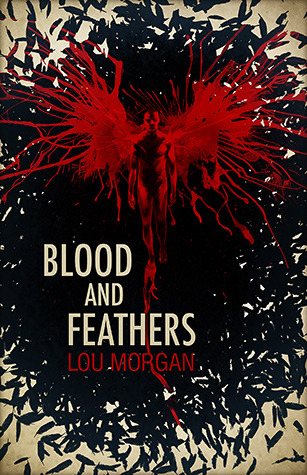 Blood and Feathers – Lou Morgan
Blood and Feathers – Lou Morgan
Discovery blamed on: A Fantastical Librarian
About the Book
“What’s the first thing you think of when I say ‘angel’?” asked Mallory. Alice shrugged. “I don’t know… guns?”
Alice isn’t having the best of days. She was late for work, she missed her bus, and now she’s getting rained on. What she doesn’t know is that her day’s about to get worse: the epic, grand-scale kind of worse that comes from the arrival of two angels who claim everything about her life is a lie.
The war between the angels and the Fallen is escalating; the age-old balance is tipping, and innocent civilians are getting caught in the cross-fire. If the balance is to be restored, the angels must act – or risk the Fallen taking control. Forever.
That’s where Alice comes in. Hunted by the Fallen and guided by Mallory - a disgraced angel with a drinking problem and a whole load of secrets – Alice will learn the truth about her own history… and why the angels want to send her to hell.
What do the Fallen want from her? How does Mallory know so much about her past? What is it the angels are hiding – and can she trust either side?
Caught between the power plays of the angels and Lucifer himself, it isn’t just hell’s demons that Alice will have to defeat.
—
 Dead of Winter – Lee Collins
Dead of Winter – Lee Collins
Discovery blamed on: The Ranting Dragon
About the Book
Cora and her husband hunt things – things that shouldn’t exist. When the marshal of Leadville, Colorado, comes across a pair of mysterious deaths, he turns to Cora to find the creature responsible, but if Cora is to overcome the unnatural tide threatening to consume the small town, she must first confront her own tragic past as well as her present.
—
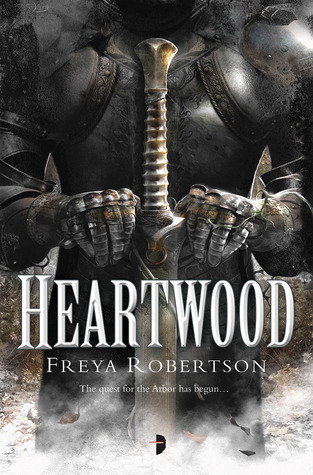 Heartwood – Freya Robertson
Heartwood – Freya Robertson
Discovery blamed on: The Founding Fields (not released until October)
About the Book
A dying tree, a desperate quest, a love story, a last stand.
Chonrad, Lord of Barle, comes to the fortified temple of Heartwood for the Congressus peace talks, which Heartwood’s holy knights have called in an attempt to stave off war in Anguis. But the Arbor, Heartwood’s holy tree, is failing, and because the land and its people are one, it is imperative the nations try to make peace.
After the Veriditas, or annual Greening Ceremony, the Congressus takes place. The talks do not go well and tempers are rising when an army of warriors emerges from the river. After a fierce battle, the Heartwood knights discover that the water warriors have stolen the Arbor’s heart. For the first time in history, its leaves begin to fall…
The knights divide into seven groups and begin an epic quest to retrieve the Arbor, and save the land.
—
 Blackbirds – Chuck Wendig
Blackbirds – Chuck Wendig
Discovery blamed on: Seeing this book reviewed on every blog on the planet.
About the Book
Miriam Black knows when you will die.
She’s foreseen hundreds of car crashes, heart attacks, strokes, and suicides.
But when Miriam hitches a ride with Louis Darling and shakes his hand, she sees that in thirty days Louis will be murdered while he calls her name. Louis will die because he met her, and she will be the next victim.
No matter what she does she can’t save Louis. But if she wants to stay alive, she’ll have to try.
Author Interview | Doug Lain
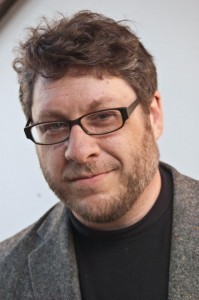 Yesterday, I reviewed the book Billy Moon, a short novel which truly surprised me. I enjoyed it so much, I decided to interview the author. This also happens to be my first author interview after my cancer treatment, and it’s taking me some time to get back into the swing and art of interviewing. My cumbersome questions are evidence of this. Thanks so much to Doug Lain for being my (very interesting) test subject.
Yesterday, I reviewed the book Billy Moon, a short novel which truly surprised me. I enjoyed it so much, I decided to interview the author. This also happens to be my first author interview after my cancer treatment, and it’s taking me some time to get back into the swing and art of interviewing. My cumbersome questions are evidence of this. Thanks so much to Doug Lain for being my (very interesting) test subject.
Billy Moon is a historical fantasy, and that blend of history and fantasy fascinates me. I love historical fantasy, and I love it even more when authors pull it off with depth and finesse, so I wanted to explore just what goes into writing a historical fantasy book, while letting readers get to know the author a bit at the same time.
I hope you enjoy.
—–
When you aren’t writing, or podcasting, what are you typically doing?
I’m very tempted to give a Zizekian answer to this question. Slavoj Zizek is a Slovenian psychoanalysis and philosopher with a perverse sense of humor. He’s said that, whenever he’s asked a question meant to humanize him, a question like “What do you enjoy doing in you’re spare time?” he’s always tempted to answer that he spends his spare time with his pornography collection and ripping the wings off of flies. The idea behind this answer is that he thinks that these efforts to humanize him are also unconscious efforts to neuter him and his work. A more innocent answer to the question implies that, while Zizek might be a radical philosopher, we don’t have to worry about him because he likes hiking or preparing chocolate cakes or collecting stamps. He’s just like us after all.
Still, in an effort to stand on my own I’ll mention that lately I’ve been playing the role of Inspector Lestrade opposite my eight year old son Noah’s Sherlock, but I should also confess that I tend to binge on Netflix and waste time on Facebook in my spare time. I’m a big fan of Arrested Development and Firefly.
What started you on the writing road?
There were a combination of factors. Mostly what drove the decision was my intense need for attention and my utter lack of talent in the performing arts. That is, I decided I’d be a writer during high school, after I failed to get the lead role in The Crucible. Instead I was given the role of the undertaker’s assistant.
After that I decided to get even with the golden boys in the drama department by becoming a writer. I’d put the words in their mouths and make them spout my nonsense instead of Arthur Miller’s fine dialogue, but somewhere along the line I gave up on plays and screenwriting and wrote short stories instead. In fact, that happened almost immediately. I recall I started submitting stories for publication during my senior year and made my first sale to a magazine called “The Fiction Primer” during my freshman year at college. The story was about a college student whose actress girlfriend broke his heart. It was entitled “Never Wish Me Good Luck.” One thing that was interesting about it, however, was that I originally wrote it out of sequence and used a framing device, just a bit of prose about the broken hearted ex-actor who was holed up in his dorm room, to hold the story together. My creative writing instructor hated it and made me ditch the frame and put the story in chronological order. His name was Sterling Watson. I still resent him.
You podcast as well as write and blog. Can you tell the readers a little about your podcast? What started you podcasting?
My podcast has the same name as the ‘zine I used to edit which I actually first started publishing way back in 1993. I can’t believe how long ago that is. I started podcasting partly in an attempt to promote the ‘zine (although after my first podcast there never was another issue of Diet Soap the ‘zine) and partly because I was working a job at Comcast in Beaverton. I was a sales rep at Comcast and I won an iPod Nano as a prize and started listening to a podcast called the C-Realm. Around that time George Bush came on television and told everyone that he’d scheduled a rerun of the Great Depression.
So, again, the decision was overdetermined. Still, I’d have to say that as the zero years closed out and the world teetered on the verge of economic collapse podcasting was my way of trying to figure out just what was going on. Since 2009 when the podcast started I’ve interviewed a slew of philosophers, artists, and economists and I’d say that the last four years of weekly interviews has done quite a lot to shift my perspective.
You have a few short stories and short story collections published. Billy Moon appears to be your first full-length novel. Can you talk a bit about the differences between writing short stories and novels (besides the obvious difference in length)? Is one more difficult than the other? Why/why not?
I’ve found that writing a novel requires more patience than writing a short story. I went through several drafts and made major changes late in the game, but that isn’t different because I do the same thing to almost all of my short stories. It’s just that, writing a longer work, means that radical changes take longer to accomplish.
The main difference between a novel and a short story is that in novels the characters are usually more sympathetic. This makes natural sense because you’re asking the reader to spend a lot of time with the characters. Of course, there are great novels with utterly unlikable characters, but being unlikable is not quite the same thing as being unsympathetic.
The other difference between novels and short stories is that, if you’re going to write a novel that holds to the same noise to signal ratio as a short story you have to have more to say. That’s why writing about the events of May ’68 was helpful. It’s a subject worth spending time on.
 Billy Moon is an interesting book about the son of A.A. Milne, the author of Winnie the Pooh. What is it about Christopher Robin Milne that captivated you enough to write a book about him?
Billy Moon is an interesting book about the son of A.A. Milne, the author of Winnie the Pooh. What is it about Christopher Robin Milne that captivated you enough to write a book about him?
Christopher Robin Milne the man was a very mature, competent, and thoughtful person. He was a veteran of World War II, a bookseller, a family man, and a naturalist. He was a person who had come to terms with his childhood, and beyond that with growing up in the shadow of a fictional childhood as represented in his father’s books. After reading his memoirs The Enchanted Places and Path Through the Trees I decided that a man like Christopher Robin, a man who had overcome his childhood quite consciously and willfully, was perhaps the perfect protagonist for a novel about May 1968.
Historical fantasy blends both history and fantasy. Billy Moon explores a lot of the political turmoil of Europe in the ‘60s. Was it hard to realistically portray a very unique period of modern history, while adding fantasy elements to the story? Was it hard to balance research, realistic portrayal of a historical figure and time period, and the fantasy elements?
Blending fantasy and history wasn’t difficult, but getting the history right, the culture right, was difficult. I still am not confident that I was completely successful. I’ve never lived in France nor do I speak French, so a lot of research went into writing Billy Moon, research that you might not pick up on. I recall spending a lot of time researching the brand names for sandwich bread as opposed to baguettes, for example. I read a book called French Frenzies: A Social History of Pop Music in France. Of course, I read a great deal about May 1968. I may own every English language book on the subject.
A lot of this book focuses on the very real and believable character Christopher Robin Milne. You do a great job at bringing this person to life, exploring how he grows, develops, as the book progresses. Were you ever afraid that you wouldn’t be able to realistically capture the voice of this person and bring him to life? How did you go about your research of him?
I was concerned about being accurate to the man and I was simultaneously concerned about being too accurate. I changed a lot of details about him, actually, just to be sure that I wasn’t stepping too hard on his memory. My Christopher Robin is fictional and he’s probably more like me than he is like the real Christopher.
Seeing as how you wrote a historical fantasy novel, how did you create the surreal, dreamlike, and/or fantasy elements? In other words, how did you/was it difficult for you to create a realistic “magic system” inside of a real historical setting?
I wonder if I did create a realistic “magic system.” What I aimed at doing was taking French radical theory literally. So, for instance, I tried to use my understanding of Althusser’s notion that ideology shapes and substantializes our social lives, even our identities, and transform that understanding into a liberalization or concretization. I also lifted some ideas from Aboriginal Australia, basically a very Westernized version of the dreamtime, in order to put the French theory into the world.
Billy Moon really toys a lot with relationships. The relationship between fantasy and reality. The relationship between son and father, and more. Not only does it deal with relationships, but it also explores how these relationships have a very real, lasting, and permanent impact on the lives of many people and even situations. It can be heady emotional stuff, and very profound. I was rather surprised by how much emotion and depth you put into a book that isn’t too long. Was it difficult for you to explore relationships like that uniquely and candidly? Did you draw on life experiences to make these relationship and deep emotional threads so realistic?
I find this to be an interesting reaction because, to some extent, the relationships between the characters were also informed by French theory. As I said at the outset, I’m a big fan of the psychoanalyst and philosopher Slavoj Zizek, and I tried to apply his notions about human families, authority, and identity to my characters. Of course, every interpretation of a theory reveals as much about the interpreter as it does about the theory, so I’m sure that I did turn to my own experiences quite a lot as I wrote the book. Maybe using Zizekian philosophy as my guide to human relationships was a way to shield myself from the very personal nature of what I was writing. I’m not sure.
What do you like about writing SFF?
I like the way the unreality in fantasy stories, the magic in them, can allow me to think about the problems that obsess me. I majored in philosophy back when I was a young man, and writing science fiction and fantasy stories is maybe my way of keeping a hand in, that and doing a philosophy podcast.
My favorite SF writer, Philip K Dick, once said that “The very best science fiction ultimately winds up being a collaboration between author and reader, in which both create—and enjoy doing it, [experiencing] the joy of discovery of newness.” I like that a lot. I think writing in this genre is a great way to collaborate with readers as I try to think about the possibility of something new.
Thank you so much for your time. Is there anything else you want to add?
Nothing except some links. That is, if you’d link to my podcast, my blog, my Facebook page, my Netlog (although I don’t know what that is), my twitter account, my tumblr, my book, my mother’s maiden name, and my favorite color I’d appreciate it.
September 4, 2013
Thinking Through Type | The Great PR Machine and our place in it
An odd thing has started happening recently. I’ve started having a lot of newish bloggers and reviewers contact me for advice. How should they promote their websites? How should they write reviews? How much promotion is too much? How do they get an audience? I don’t know why they ask me these questions, but it is flattering to think that someone out there actually thinks I know what I’m talking about. I’m less than certain most of the time.
The fact is, this post has been gestating for a few months now as a direct result of the questions people ask me. These questions got me thinking about the importance of reviewers, and our actual role in the author/publishing universe. I’ve been interviewing numerous people, and throwing questions into the ether to get responses from numerous and diverse parties. I’ve been hoarding all of these answers and trying to decide just how I would explore this topic with all the information I have gathered.
This is a tricky subject, and what I’ve learned is that everyone has a different perspective of how to effectively promote and what the role of the reviewer is. So I’m going to break this post into three sections. I will focus on the reviewer, the author, and the publisher, respectively and try to explore this topic, while asking questions that this research has made me think of, along the way.
—
The Question of Reviewer Publicity
I seem to approach the issue of publicity different than pretty much anyone else I’ve talked to so far. I almost never look at website stats. I also only visit other blogs once a week. Why? Because if I focus too heavily on stats, I turn reviewing into some sort of a competition, which sucks all the fun out of it for me. I only read other blogs once a week, because often they are reviewing something I’m reading, or about to read, and I don’t want their reviews to affect mine.
The questions reviewers often ask me is, “How do I adequately advertise my reviews? How do I know if I’m pushing it too much, or not enough?” The question I want to ask them is, should our focus even be on how to advertise our reviews, or should we focus more on the quality and quantity of what we write, and trust the audience to follow in its own course?
The truth is, I don’t have an answer for you. I’m probably the laziest publicity person on the planet. I approach my website, and life in general, the same way. You either like what I’m saying and come back, or you don’t. No sweat off my back either way. For me, this all goes back to why I very rarely, if ever, look at website stats. I review for fun. I run Bookworm Blues for the sheer joy of sharing my genre excitement with whoever chooses to stop by. If I turn this into a contest (IE: I wish I was as popular as (insert website name here). I wonder how they do it. Maybe I should change my content.) then I feel like I lose some of my unique voice because I try too hard to become something I’m not by following what works for others.
Most bloggers I’ve talked to, however, have the opposite point of view. Most bloggers pay close attention to their stats, and they keep mental notes on what posts bring in how many hits so they know what works and what doesn’t work. Typically they get hits by tweeting links, or posting them on various social networking sites like Twitter, Facebook, and to a lesser extent, Google +. This gets the word out, and retweets, reposts, and etc. spread it around. It’s a good way for bloggers to get views, and track what way the genre wind is blowing. Then, if they are smart about it, they tap into that wind, and ride the wave. Most bloggers do this really well.
New bloggers need to focus on publicity more than established bloggers. The more established blogs have the ability to rely on an already dedicated audience who often does the PR legwork for the blogger (For example, I don’t consider myself popular by any stretch of the word, but I tweet my links once, and then I retweet whatever people say about my posts. In that respect, the audience does the PR work for me.). The new blogs are the ones who seem to focus more on tweeting/sharing links throughout the day, and hoping someone out there grabs a link and shares it. One share can go a long way toward establishing an audience for a new blog. Commenting on other blogs is also an important way to spread the word about your own website and get readers. The more you comment, the more people will notice that you are an active, interested, intelligent individual, and attention will eventually come your way.
So now you are saying, “Sarah, this is stupid. Everyone knows this, so why are you saying it again?”
There’s another angle to all of this that doesn’t often get addressed. Publicity is great, and it serves the important function of making sure you aren’t just talking to yourself publically. However, as I touched on above, if we focus too much on publicity and getting hits, we could easily lose our unique voices. I read the blogs I read because I enjoy the diverse views and styles of the people who run them. Tailoring your posts to attract more hits is logical on one level, but if we run our websites because we love the genre, and we are fueled with a passion to express our love, as many of us claim to be, then why do stats matter?
—
Reviewer Relationship to Authors
In theory, reviewers are a useful tool for authors to use to spread the word about their books, get more sales, and attract attention. So when I asked a bunch of authors how they view the importance of blogs, I was rather surprised with their answers.
A majority of authors told me that, no matter how many reviews get posted on sites, regardless of their popularity, their sales never change (“That was even true when I got PW and Library Journal reviews. My sales never changed,” one author told me.). The one website that seems the most important for authors with regards to boosting their sales Amazon, a website that many reviewers doggedly avoid using for numerous reasons (“I don’t like putting reviews on Amazon. They edit reviews. I don’t like my reviews edited,” one reviewer said.). A few authors went as far as to say that blogs are great for the enthusiastic, but the general book buying population has never heard of blogs and rarely visits them so they only serve to excite an already excited fanbase. This leads me to believe that, on the author’s part, blogs are wonderful and exciting, a great way to spread the word, and motivate them with their writing, but they otherwise lack effectiveness in advertising to the average book-buying masses where the numbers truly count.
Am I trying to dissuade bloggers from blogging, or make them feel any less important with their genre-love efforts? Of course not. I’m one of you. I love what I do. However, my discussions with numerous authors on this topic made me feel like there is a huge divide between authors and bloggers, and their interpretations as to the usefulness of reviewer’s websites. Then again, I don’t think the primary goal of most reviewers is to run a website so (insert author here) can get more sales. That would be a promotion site, not a reviewer website. We do this for the love of the genre, and an expanding readership just means that our excitement is adequately infective. That being said, I felt that many authors lamented the fact that blogs are a useful, but often misused tool on their part. If only bloggers could inject their passion and desire into the average Barnes and Noble customer. Maybe we do on some extent, but many seemed to think that we missed the average reader’s target.
Regardless of our effectiveness for authors to advertise their amazing books to the masses, one thing held true with every author I talked to. One person summed it up beautifully, “Reviewers really show us what gets readers excited, and what doesn’t work so well. That’s probably the best part of blogs. Authors can read them, and see exactly what went wrong, or right. The really good websites with thoughtful critical reviews are like a crash course in writing. They can be incredibly useful in that respect.”
When all of that is said and done, I can’t help but wonder at what exactly the role of bloggers is in the great PR machine. The successful bloggers are inundated with books, interviews, and the like, but if most authors feel that, in many advertising respects, we aren’t really sale-boosting useful, what do we do? Well, one author said, “Bloggers tell authors and publishers what is popular, and the really good blogger will spread their excitement and love throughout the genre.”
I tend to think that’s a good thing. Bloggers might not boost sales too much, but in truth, we are an avid and active fanbase. The opportunistic author will realize that bloggers often help spread excitement throughout the community. We might not raise the number in sales too much, but this genre-loving fanbase buys a lot of books and I’d be lying if I didn’t admit that I have bought a ton of books based purely on how blogs I admire reviewed them. And to see evidence of this infectious excitement, and how fast and far it spreads, all you really have to do is look at the websites who post thoughtful articles about the Hugo Awards, sexism in SFF, and so much more. One website lights the fire, and plenty of others serve to spread the flame.
—
The Great Publisher PR Machine
Now, I’ve addressed publicity in regards to reviewers and authors, but what about publishers? After all, these are the people forking out their time and money to send us ARCs, and copious amounts of books. In order to get a better handle on this aspect of the discussion, I asked several PR gurus and several large publishing houses the same few questions. I will keep them all anonymous, and just paraphrase what they said. The interesting detail for this section of my article is the fact that every PR person I talked to agreed on all points. There was no deep or lasting difference of opinion. It’s interesting to think that, among bloggers and authors, the opinions and viewpoints might change depending on the person, but the publishers over us all seem to be fairly unanimous in their perspectives.
The blogger-publisher relationship is more ambiguous in many respects. Publishers send us books. We read them and talk about them. Bloggers tend to not look a gift horse in the mouth (I like to say “thank you” and not ask too many questions). Due to the fact that many of us don’t ask too many questions, we don’t often know how publishers choose whom to send books to, or why. What role do bloggers serve in their great PR Machine?
If you take the information I’ve given you so far, you’ll probably guess right away that our primary focus is to spread the word and excitement about the product the publisher is selling. Put another way, the author is the artist, the publisher is the factory where the art gets mass produced, and the blogger is where the publisher turns to get insight into the market, and also where a flame of excitement might be lit and (hopefully) will spread.
When you consider how many books some of us get sent (two weeks ago I received over 30 books in a five-day period. No joke.) How do publishers decide which blogs to focus on, and which to pass over? The system seems to be the one area publishers differ. Most publishers check to see how many followers the blog has on Twitter, how active they are in commenting and starting/spreading SFF discussions. Most publishers want to make sure that bloggers are writing thoughtful reviews, and that they actually read a good chunk of the books they receive and review them in a timely manner. Some publishers send out questionnaires, and then check to verify the answers bloggers give them. A few try to predict which blogs will be “big” in the future, and try to jump on them while they are young and still developing. Regardless of their tactics, it’s quite impressive to see just how much publisher’s check into bloggers, and their activity in the community.
It’s quite interesting to step back and see just how much importance is heaped on how active the blogger is on their own blogs, other blogs, and the community in general. In fact, when we go back to the top of this article and look at my first section, you’ll notice I put an importance on how active bloggers are, too. So did the authors. In fact, every section so far has agreed on the fact that the blogger’s importance is, in part, based on how active they are in the community. Why? Because part what reviewers do regardless of if we mean to or not, is market excitement, and that excitement is an important yardstick publishers and authors use to gauge the market to which they cater to.
While most publishers seem to pay varying amounts of attention to how bloggers promote their blogs, what works and what doesn’t, they all notice when bloggers write something that gains the attention of the genre audience. A sort of “look at me” industry flag gets lifted, and the publishing community tries to jump on that bandwagon. If a review gets tweeted, and then retweeted, and retweeted, the publisher will, and does notice. It makes the reviewer attractive. They send us books, hoping that we’ll get tweeted, and retweeted, and retweeted. The more that happens, the more we tend to be in demand.
So why do publishers like us? We spread the excitement. We are a very vocal part of the genre community, and we are good at telling them how the market is blowing. We also spread the excitement about the books we read. We might not boost sales too much, but we are a very vocal, animated portion of the market that allows publishers to do valuable market research, for the price of a few books in the mail. In return, we get excited, and spread that excitement to the masses.
I’m sure it’s more complex than that, but that’s what it seemed to boil down to in my research.
—
This is an incredibly long post, which may or may not actually inform anyone of anything new. This whole thing basically boils down to my exploration into the role of the reviewer through the eyes of the reviewer, author, and publisher. Do I have all the answers? Of course not. I spent a few months asking a lot of people a lot of questions, and this is a short summary of everything I learned. It’s not what I expect.
I think bloggers often think of themselves as a marketing team, and in some ways we are, but I don’t think we market in the way most of us think we do. Bloggers talk about books, but our true, valuable importance, is laid on the enthusiasm and love for the genre (and it’s books) that we spread. Maybe that sounds a little demeaning to some, but think of it in this light. Reviewers serve as a sort of genre thermometer for authors and publishers. We play a vital role in telling them what the larger audience wants to read, and what they expect to see on the shelves of their local bookstore. Furthermore, think of how much our enthusiasm has impacted the community. We’ve successfully shined a light on sexism, issues regarding awards; we’ve impacted careers (Michael J. Sullivan, anyone?) and so much more. We expand the culture, and keep it alive and burning bright with passion. Authors and publishers tap into that passion.
Honestly, can you really put a price on honest-to-goodness, deep burning excitement? When you really think about it, bloggers might not play the role in the industry that we think we do, but we have a really fun, and very important job. So pat yourselves on the back. Reviewers are pretty damn cool.
September 3, 2013
Billy Moon – Douglas Lain
 About the Book
About the Book
Billy Moon was Christopher Robin Milne, the son of A. A. Milne, the world-famous author of Winnie the Pooh and other beloved children’s classics. Billy’s life was no fairy-tale, though. Being the son of a famous author meant being ignored and even mistreated by famous parents; he had to make his own way in the world, define himself, and reconcile his self-image with the image of him known to millions of children. A veteran of World War II, a husband and father, he is jolted out of midlife ennui when a French college student revolutionary asks him to come to the chaos of Paris in revolt. Against a backdrop of the apocalyptic student protests and general strike that forced France to a standstill that spring, Milne’s new French friend is a wild card, able to experience alternate realities of the past and present. Through him, Milne’s life is illuminated and transformed, as are the world-altering events of that year.
272 pages (hardcover)
Published on August 27, 2013
Published by Tor
Author’s webpage
This book was sent for me to review by the publisher.
—–
The thing that attracted me to Billy Moon first was the fact that it’s a historical fantasy novel. I love historical fantasy, and I don’t read enough of it so that genre tends to pull me in pretty quickly. I was also interested in how Lain took a historical figure like Christopher Robin Milne, and based a novel around him. As many people know, Christopher Robin Milne is the son of A.A. Milne, who wrote Winnie the Pooh.
Billy Moon is an interesting novel in the fact that it’s equal parts history and fantasy. Much of this novel takes place during the turbulent sixties in Europe, in Paris, specifically. It’s a time period where I visualize topless hippies in San Francisco, but know nothing about how the sixties were in Paris. Paris in the late sixties was really a surreal place. There were plenty of strikes which basically paralyzed France. These strikes caused some fascinating political tensions and transformations. Into this hotbed of activity, Lain weaves his own threads of the fantastic, taking a realistic and interesting Paris, and elevating it to something more.
Enter Christopher Robin Milne, a World War II vet, who has his own deep seeded issues. The combination of turbulent Paris, Milne’s own mixed up perspectives and past, and his interesting companions and you truly have a fire keg waiting to explode. That is, perhaps, one of the biggest strengths of Billy Moon. Lain weaves together so many personal and political issues that Lain plays with, that it’s actually quite engrossing and surprising. It’s hard to separate the fantasy and reality, the personal from the public, because it all mixes together so flawlessly.
As I mentioned above, Lain mixes fantasy and reality together almost flawlessly. In fact, so flawlessly that sometimes the lines between the two can be blurred and confused. For example, in the first chapter there is an incident with a cat, which switches between being real and stuffed. This introduces the reader to Christopher Robin Milne’s personal issues of struggling to differentiate reality from fantasy (to put it as simply as possible). While it is effective, this tactic can have a jarring and confusing effect for the reader. It’s hard to tell what is what, and that’s exactly what Lain sets out to do – confuse the reader, show them a bit of what it’s like in Milne’s mind, but some readers might find his tactics a bit too confusing and distracting.
Perhaps one of the most interesting, and profound aspects of this book was how Lain toys with relationships. Milne’s relationship to his (deceased) father is one of both love and a sort of interesting loathing. Milne struggles with his father’s infamous name, his books, and the altered reality it all gave him. On the other hand, Lain also toys with the relationships between reality and fantasy, or dreams. It’s actually quite provocative how he uses history and situations to fuel his exploration of relationship dynamics and their profound and lasting impact on others.
And then Milne figures out why he is the way he is, there are several plot twists and ah ha moments. Milne finds drive and dedication and Lain’s writing carries the reader through it all. Lain’s writing is, engrossing. It’s confusing and surprising and perfectly blends many layers of reality, fantasy, relationships, and personal growth. Billy Moon really isn’t that long of a book. It’s a quick, easy read, but once you’re done you’ll be rather surprised with everything Lain packs into it.
Billy Moon surprised me. I expected a nice easy read, but I got something with depth, a very real historical presence. By the end, I felt like Lain wasn’t writing about a character he studied for some period of time, but he was writing about an experience he had with a good friend. Despite the fact that Billy Moon can be confusing at times, the execution is nearly flawless. This is a short, quick book, that toys with some very provocative themes and is sure to please many readers.
4/5 stars



